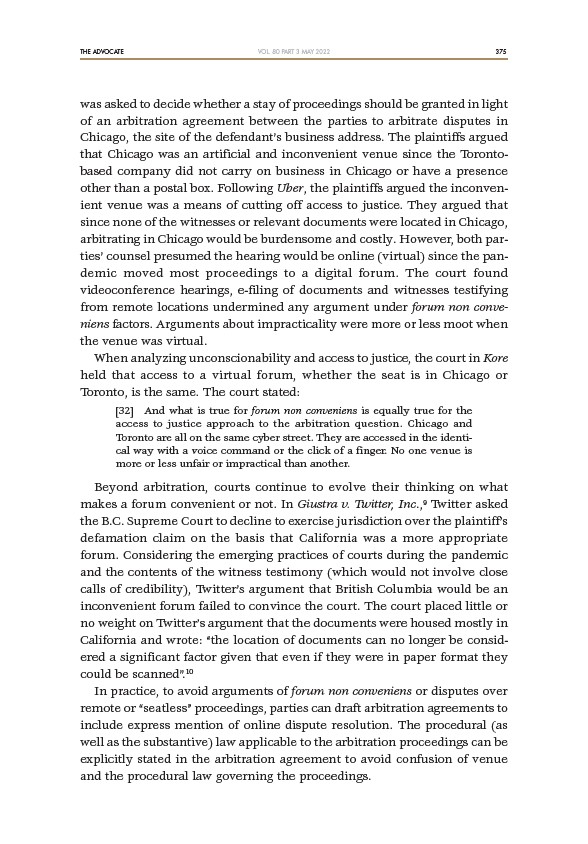
THE ADVOCATE 375
VOL. 80 PART 3 MAY 2022
was asked to decide whether a stay of proceedings should be granted in light
of an arbitration agreement between the parties to arbitrate disputes in
Chicago, the site of the defendant’s business address. The plaintiffs argued
that Chicago was an artificial and inconvenient venue since the Torontobased
company did not carry on business in Chicago or have a presence
other than a postal box. Following Uber, the plaintiffs argued the inconvenient
venue was a means of cutting off access to justice. They argued that
since none of the witnesses or relevant documents were located in Chicago,
arbitrating in Chicago would be burdensome and costly. However, both parties’
counsel presumed the hearing would be online (virtual) since the pandemic
moved most proceedings to a digital forum. The court found
videoconference hearings, e-filing of documents and witnesses testifying
from remote locations undermined any argument under forum non conveniens
factors. Arguments about impracticality were more or less moot when
the venue was virtual.
When analyzing unconscionability and access to justice, the court in Kore
held that access to a virtual forum, whether the seat is in Chicago or
Toronto, is the same. The court stated:
32 And what is true for forum non conveniens is equally true for the
access to justice approach to the arbitration question. Chicago and
Toronto are all on the same cyber street. They are accessed in the identical
way with a voice command or the click of a finger. No one venue is
more or less unfair or impractical than another.
Beyond arbitration, courts continue to evolve their thinking on what
makes a forum convenient or not. In Giustra v. Twitter, Inc.,9 Twitter asked
the B.C. Supreme Court to decline to exercise jurisdiction over the plaintiff’s
defamation claim on the basis that California was a more appropriate
forum. Considering the emerging practices of courts during the pandemic
and the contents of the witness testimony (which would not involve close
calls of credibility), Twitter’s argument that British Columbia would be an
inconvenient forum failed to convince the court. The court placed little or
no weight on Twitter’s argument that the documents were housed mostly in
California and wrote: “the location of documents can no longer be considered
a significant factor given that even if they were in paper format they
could be scanned”.10
In practice, to avoid arguments of forum non conveniens or disputes over
remote or “seatless” proceedings, parties can draft arbitration agreements to
include express mention of online dispute resolution. The procedural (as
well as the substantive) law applicable to the arbitration proceedings can be
explicitly stated in the arbitration agreement to avoid confusion of venue
and the procedural law governing the proceedings.